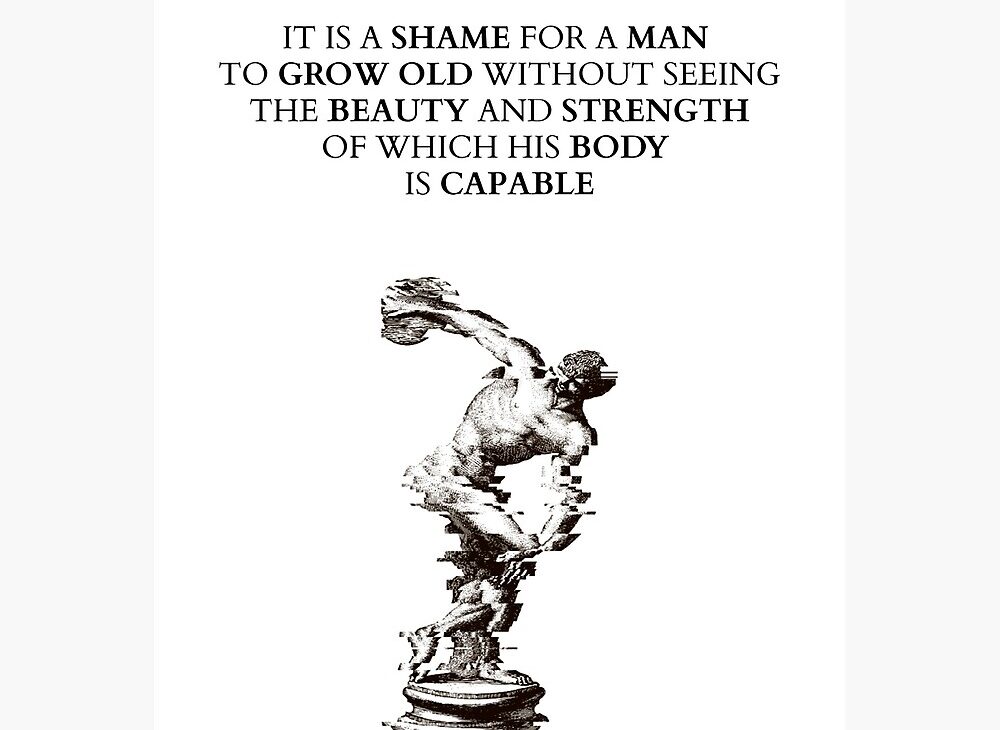Socrates, the ancient Greek philosopher, is widely known for his philosophical teachings that have left an enduring impact on Western thought. Among his many insights, one of his quotes stands out as a timeless piece of wisdom that is as relevant today as it was over two millennia ago, “No man has the right to be an amateur in the matter of physical training. It is a shame for a man to grow old without seeing the beauty and strength of which his body is capable.” The quote is about the importance of physical training, and how it is a shame for anyone to grow old without having explored the potential of their own body. In this blog post, we’ll explore the meaning of this quote and its deeper implications for our lives.
The Meaning of the Quote
At first glance, Socrates’ quote may seem to be a simple statement on the importance of physical fitness. However, if we look more closely, we can see that it contains a much deeper meaning. Socrates was not merely encouraging people to exercise for health and fitness, but was rather speaking to the broader idea of self-improvement.

When Socrates spoke about physical training, he was not just talking about exercise or fitness in isolation. Rather, he was making a broader point about the need for us to develop all aspects of ourselves, including our minds, bodies, and souls. He believed that a well-rounded individual should be physically fit, mentally sharp, and morally upright. By focusing on physical training, he was encouraging us to take a holistic approach to self-improvement.
Socrates was also making a statement about the importance of taking responsibility for our own lives. He believed that we all have the power to shape our destinies, and that it is up to us to take action and pursue our goals. By suggesting that it is a shame to grow old without exploring the potential of our own bodies, he was urging us to take control of our lives and push ourselves to be the best that we can be.
Deeper Implications
Socrates’ quote has deep implications for our lives. By encouraging us to take a holistic approach to self-improvement, he is suggesting that we should strive for balance in all areas of our lives. This means not neglecting any aspect of ourselves, but rather, seeking to develop all of them in harmony. By doing so, we can achieve a sense of wholeness and completeness that is essential for a fulfilling life.
Furthermore, Socrates’ quote is a reminder that we are responsible for our own lives. We cannot blame others for our failures or shortcomings, but must take ownership of our actions and work to improve ourselves. This requires us to be proactive, to set goals for ourselves, and to take action to achieve them.
Finally, Socrates’ quote is a call to action. It is an invitation to explore the potential of our bodies and to embrace the beauty and strength that is within us. By doing so, we can discover new abilities and talents that we never knew we had, and we can push ourselves to achieve new heights of excellence.
How to Incorporate Physical Fitness into Your Daily Routine
If you’re not used to exercising regularly, it can be tough to know where to start. The good news is that there are plenty of ways to incorporate physical fitness into your daily routine. You don’t need to spend hours at the gym to reap the benefits of exercise. Here are some tips to help you get started:
- Start small: Begin with just a few minutes of exercise each day, and gradually increase the time and intensity.
- Find an activity you enjoy: Exercise doesn’t have to be boring. Find an activity that you enjoy, whether it’s swimming, dancing, or hiking.
- Set goals: Setting goals can help keep you motivated. Whether you want to run a 5k or lose 10 pounds, having a specific goal in mind can help you stay on track.
- Make it a habit: Incorporate exercise into your daily routine. Whether it’s going for a walk during your lunch break or doing yoga before bed, find a time that works for you and stick to it.
Conclusion
Socrates’ quote “It is a shame for a man to grow old without seeing the beauty and strength of which his body is capable.” about physical training is a timeless piece of wisdom that holds deep implications for our lives. By encouraging us to take a holistic approach to self-improvement and to take responsibility for our own lives, he is urging us to strive for excellence and to embrace the potential that is within us. In doing so, we can achieve a sense of wholeness and completeness that is essential for a fulfilling life.










